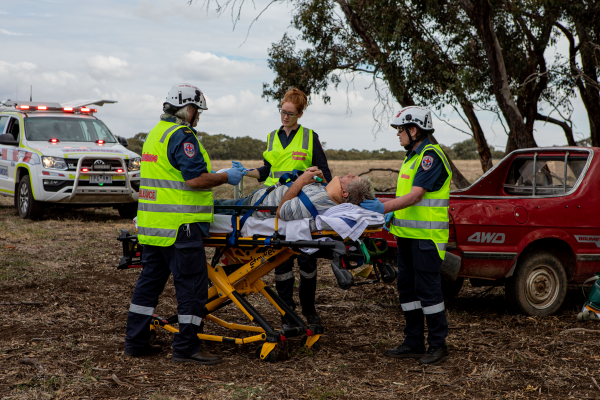26 April 2023
Collaboration vital in navigating global shortage of heart attack medications

Pictured: Ambulance Victoria crew, regional Victoria.
HSV’s Supply Chain Surety team has been heavily involved in managing the allocation of heart attack medications to bush clinics and ambulance services amid an ongoing global supply shortage.
The shortage is due to manufacturing capacity constraints following an increase in global demand for two acute heart attack treatments, alteplase and tenecteplase. In August 2022, the Therapeutic Goods Administration (TGA) advised that based on modelling, usage would need to be reduced by at least 35 per cent nationally or tenecteplase stock would be exhausted by the end of 2022.
HSV has worked closely with the supplier and health services to operationalise conservation guidelines issued by the TGA in October 2022.
The guidelines include prioritising supplies of tenecteplase to bush-based clinics and ambulance services and extending product shelf life by 12 months. Metropolitan and larger regional hospitals were advised to use alteplase, an alternative medication to tenecteplase. While both medications are thrombolytics used for the treatment of heart attacks, alteplase is also used for acute ischaemic stroke.
HSV’s Supply Chain Surety team worked collaboratively with health services and the supplier to manage and allocate supplies, often relying on modelling in situations where historical data was not available.
“The process is complex because it will take some time for the manufacturer to increase capacity,” says HSV Director Supply Chain Surety Kate Warren.
“Our strategy involved moving stock from larger hospitals to ambulance services as a priority. We worked with our wholesalers to create a stock transfer process and with Ambulance Victoria to organise logistics,” says Kate.
Crucially, the team successfully negotiated with one of our key suppliers to double the original allocation of alteplase until the end of 2023 when shortages are expected to ease.
“The supplier was initially estimating the orders based on their data, but this wasn’t enough to meet requirements. We were able to work with them to achieve a more realistic volume of product, says Kate.
“We’re very confident that we will be able to manage our allocation to deal with the shortage.”
Ambulance Victoria Senior Pharmacist Adam Ho says HSV’s support has been vital, particularly the work undertaken to allocate supply of the medication to regional centres.
“Our rural ambulances need to carry tenecteplase. If travel time to a hospital is more than 60 minutes, paramedics need to administer this potentially life-saving medication to patients en route,” he says.
“HealthShare Victoria has done great work to manage the tenecteplase distribution to ensure an uninterrupted supply to Ambulance Victoria.”
Tenecteplase is one of the products on the Critical Supplies Register (CSR), a health sector initiative to identify and manage supply chain risks for critical products.